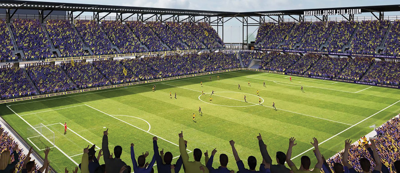
Nashville SC stadium rendering
I am very glad to see that Mayor John Cooper and Nashville SC have successfully agreed upon a plan for The Fairgrounds Nashville that puts the city first.
Knowing the parties, it’s clear that putting Nashville first has been the goal of the negotiations from the beginning. Businessman John Ingram brought Major League Soccer to town because it is the fastest-growing professional sport, and many of Nashville’s new and longtime citizens are fans. Mayor Cooper also put Nashvillians at the forefront, working to minimize the fiscal impact of the soccer stadium and preserving options for our historic Fairgrounds Speedway.
I was impressed with how Cooper and Ingram managed a tough public process. They conducted their business equitably, expressing their zeal for both MLS and racing to succeed in Nashville. Both kept their promises throughout the compromise. Cooper kept his promise to be fiscally responsible, and Ingram kept his word that Nashville SC will be a model for community support and paying for services with a livable wage.
The potential benefits from a well-executed fairgrounds plan will be another unique Nashville asset. Accommodating both professional racing and soccer on the fairgrounds’ 117 acres, Nashville could easily expect an annual economic impact nearing $500 million. If NASCAR is able to return to a renovated and expanded speedway, the annual economic impact from that alone could easily be in the hundreds of millions. Five years ago, the Fairgrounds Speedway’s short-track cousin, Bristol Motor Speedway, reported a direct economic impact of $417 million and an indirect impact of $1.4 billion over the three years preceding the report.
MLS’ estimates of its direct economic impact are also impressive at $77 million annually. Its economic windfalls of construction positions and permanent stadium employment are also considerable. It’s inarguable that sports fans are loyal and generous. Name your sport, and each fan base has proven that it’s made up of staunch supporters. They’ve proven it in Nashville over and over again. The Nashville Predators’ 2017 Stanley Cup run, for instance, generated more than $50 million for Nashville in direct economic impact during just 11 home games. The NFL flexed its fiscal muscles recently, when the 2019 NFL Draft generated a whopping $224 million in total economic impact for Nashville.
Talk of economic impact brings us to the issue of how Nashville’s business community has weathered the negotiations and the prospect of these two major sporting venues at the same fairgrounds location. It’s fair to say that uncertainty has ruled the day. Studies of MLS’ economic impact encouraged corporate support, but questions of the breadth of the impact were cold water in the simmering pot. Local businesses near the fairgrounds were boosted by the prospect of two professional sports venues in this fast-changing neighborhood, but the protracted negotiations were somewhat dismaying.
In fact, Nashville Area Chamber of Commerce CEO Ralph Schulz’s open letter to Mayor Cooper urging him to proceed with stadium construction was able to persuade only a mere handful of companies to join him. Out of the 40,000 companies located in the Nashville region, according to the chamber’s own data, Schulz was able to encourage only 100 or so companies to sign his letter. While the chamber is composed of many of Nashville’s strongest and largest corporations, and its board of directors is headed by capable leadership in Pinnacle’s Rob McCabe, the chamber itself was able to summon only a meager response.
More than 8,000 people signed the petition to build the MLS stadium; 4,848 people signed to protect Fort Negley; an astounding 66,833 people signed to protect our famous cherry trees. But the chamber was able to corral only a little more than 100 companies and individuals to sign its open letter to Mayor Cooper? Even the lighthearted petition to bring Whataburger to town has more than 6,000 signatures! For its ineffective show of might, I would have to say the chamber deserves a C for its efforts.
If we were to grade this whole negotiation, I’d say Cooper and Ingram earned an A. They worked diligently and fairly to provide a deal for Nashville in which everyone wins. Cooper ensured that MLS didn’t impede future speedway success or cause an untimely financial burden through its construction and infrastructure costs. Ingram ensured that the MLS stadium would be constructed at the agreed-upon location and maintained his commitment to the team, its fans and to Nashville as a whole. Compromise has resulted in a win for Nashville!
Bill Freeman
Bill Freeman is the owner of FW Publishing, the publishing company that produces the Nashville Scene, Nfocus, the Nashville Post and Home Page Media Group in Williamson County.





